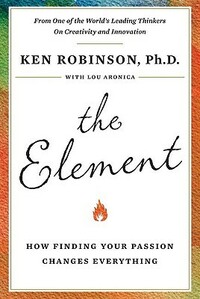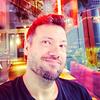You need to sign in or sign up before continuing.
Take a photo of a barcode or cover
Wasn't exactly what I wanted. I' m glad these people found their element, but I didn't need a second book to learn how to find mine.
We often talk about someone being "in their element" when they appear to both excel at something and enjoy it at the same time. Think of top sports stars, actors, musicians, or speakers. But what exactly is this "element"? Is it something anyone can access? Is it different for everyone? Turns out the answers to the last two questions are 'yes' and 'yes'. The first question forms the basis of this book.
Ken Robinson sets out to detail what the element is, how famous examples have found theirs, and how it could radically impact the lives of individuals and wider society. Win.
It's a fascinating read and really gives you food for thought about what your element might be. And herein lies the small snag at the heart of the book. He doesn't really give you any real direction as to how you might go about finding yours. True, you might find inspiration in the examples he gives of others, including Paulo Coelho, Ridley Scott, Paul McCartney, Mick Fleetwood and Susan Jeffers. But a little more assistance might have been nice - especially given his focus on the importance of those mentors and teachers who have helped his examples find theirs. Perhaps this is because he wants you to buy his follow-up book.
The first couple of chapters get a little repetitive and after a while, the endless congratulatory stories of a person going from having a terrible time to loving life get very same-y, but from about chapter 4 onwards the book hits its stride. It's a damning indictment of the education system, although more solutions could have been offered than just showing more examples of schools that do things differently. It's easy to criticise a system, but much harder to propose a new one.
That being said, it's still a fascinating and inspirational read, and highly recommended reading - particularly for policymakers.
Ken Robinson sets out to detail what the element is, how famous examples have found theirs, and how it could radically impact the lives of individuals and wider society. Win.
It's a fascinating read and really gives you food for thought about what your element might be. And herein lies the small snag at the heart of the book. He doesn't really give you any real direction as to how you might go about finding yours. True, you might find inspiration in the examples he gives of others, including Paulo Coelho, Ridley Scott, Paul McCartney, Mick Fleetwood and Susan Jeffers. But a little more assistance might have been nice - especially given his focus on the importance of those mentors and teachers who have helped his examples find theirs. Perhaps this is because he wants you to buy his follow-up book.
The first couple of chapters get a little repetitive and after a while, the endless congratulatory stories of a person going from having a terrible time to loving life get very same-y, but from about chapter 4 onwards the book hits its stride. It's a damning indictment of the education system, although more solutions could have been offered than just showing more examples of schools that do things differently. It's easy to criticise a system, but much harder to propose a new one.
That being said, it's still a fascinating and inspirational read, and highly recommended reading - particularly for policymakers.
I love Ken Robinson. His ideas on education are definitely spot on. This is also a great book for the creative minds who might not have been super awesome in school or who learn in a different way.
This was an easy read and I found it in the most part enjoyable and informative.
I was hoping for tangible guidance where Ken would help you consider how to find your own Element, but I didn’t get that. The book didn’t have a lot of structure and is quite meandering - which is a style I don’t mind at all but if you’re looking for something more practical and structure perhaps this isn’t the one.
I was hoping for tangible guidance where Ken would help you consider how to find your own Element, but I didn’t get that. The book didn’t have a lot of structure and is quite meandering - which is a style I don’t mind at all but if you’re looking for something more practical and structure perhaps this isn’t the one.
I have high expectations from Ken Robinson because of his TED Talks. I felt like this was pretty much his talk in book form. It was wonderfully written, but I derived no more from it than what I already knew.
This book started off really great and I thoroughly enjoyed the first third. It was interesting and informative and the author gave a lot of really great info.
The book is made up of interviews/monologues of famous and quasi-famous individuals most of whom are British or have British roots (the author originates from England) whose stories fit the authors description of having found The Element.
These stories were okay at first but got really redundant and boring as time went on.
The final chapter is the authors ideas on education reform or rather transformation. His ideas are spot on and he backs them with some compelling evidence. Unfortunately the Suits will never buy into these changes.
Was going to be a 3 star but downgraded to 2 stars on weak sloppy bad analogies.
Yet another waste from a 'TED star'. What a joke. Just reaffirmed my suspicions not to read or watch any TED crap.
I'd bother writing a few sentences to pass as a review but I can't even...
Yet another waste from a 'TED star'. What a joke. Just reaffirmed my suspicions not to read or watch any TED crap.
I'd bother writing a few sentences to pass as a review but I can't even...
The TED talk was ok, but it is not such an interesting content to write a book about it. It spins around the same topic for 300 pages!!!
I really appreciate his perspective. And a good reminder that everyone is different. We learn in different ways and have different interests. I can certainly see that in my children. I want to read his other books to hear what else he has to say.


